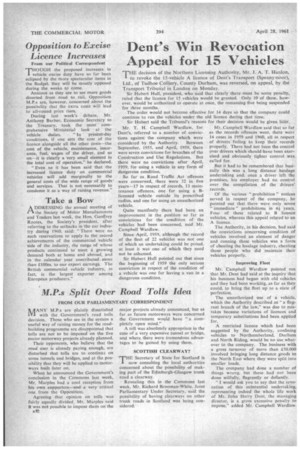Dent's Win Revocation Appeal for 15 Vehicles
Page 36

If you've noticed an error in this article please click here to report it so we can fix it.
THE decision of the Northern Licensing Authority, Mr. J. A. T. Hanlon, to revoke the 15-vehicle A licence of Dent's Transport (Spennyrnoor), Ltd., of Tudhoe Colliery, County Durham, was reversed, on appeal, by the Transport Tribunal in London on Monday.
Sir Hubert Hull, president, who said that clearly there must be some penalty, ruled that the licence for 15 vehicles would be granted. Only 10 of these, however, would be authorized to operate at once, the remaining five being suspended for three months.
The order would not become effective for 14 days so that the company could continue to run the vehicles under the old licence during that time.
Sir Hubert said the Tribunal's reasons for their decision would be given later.
Mr. T. H. Campbell Wardlaw, for Dent's, referred to a number of convictions against the company which were considered by the Authority. Between September, 1955, and April. 1959, there were seven convictions for breaches of the Construction and Use Regulations. But there were no convictions after April, 1959, for using a vehicle in any form of dangerous condition.
So far as Road Traffic Act offences were concerned, there were 32 in five years-17 in respect of records, 13 maintenance offences, one for using. a 8licensed vehicle outside its prescribed radius, and one for using an unauthorized vehicle.
Quite manifestly there had been an improvement in the position so far as convictions for the condition of the vehicles had been concerned, said Mr. Campbell Wardlaw.
Since April, 1959, although the record of the fleet of 22 vehicles was not one of which an undertaking could be proud, at least it was one of which they need not be ashamed.
Sir Hubert Hull pointed out that since the beginning of 1959 the only serious conviction in respect of the condition of a vehicle was one for having a van in a dangerous condition. Mr..Campbell Wardlaw said that so far as the records offences went, there were 14 cases in 1959 and 1960, all in respect of drivers failing to keep their records properly. There had not been the control over drivers which should have been exercised and obviously tighter control was called for.
But it had to be remembered that basically this was a long distance haulage undertaking and. once a driver left the premises, his employer had no control over the compilation of the drivers' records.
Of the various " prohibition " notices served in respect of the company, he pointed out that there were only seven " immediate" prohibitions in 4i years. Four of these related to B licence vehicles, whereas this appeal related to an A licence.
The Authority, in his decision, had said the convictions concerning condition of vehicles involved an element of danger and running these vehicles was a form of cheating the haulage industry, cheating those people who did maintain their vehicles properly.
Improving Fleet Mr. Campbell Wardlaw pointed out that Mr. Dent had said at the inquiry that his business had begun with old vehicles and they had been working, as far as they could, to bring the fleet up to a state of perfection.
The unauthorized use of a vehicle, which the Authority described as "a flagrant breach of the law," was due to mistakes because variations of licences and temporary substitutions had been applied for.
A restricted licence which had been suggested by the Authority, confining vehicles to Northumberland, Durham and North Riding, would be no use whatever to the company. The business with a gross turnover of more than £50.000 involved bringing long distance goods to the North East where they were split into smaller loads.
The company had done a number of things wrong, but these had not been done wilfully, flagrantly or defiantly.
"I would ask you to say that the revocation of this substantial undertaking, representing indeed the whole life work of Mr. John Harry Dent, the managing director, is a gross excessive penalty to impose," added Mr. Campbell Wardlaw.
























































































































